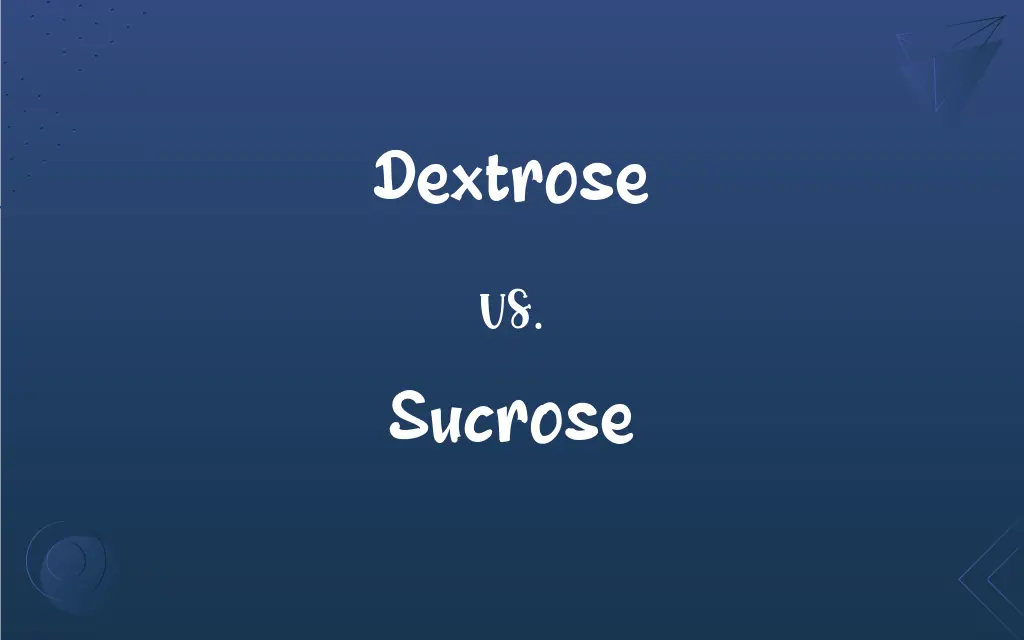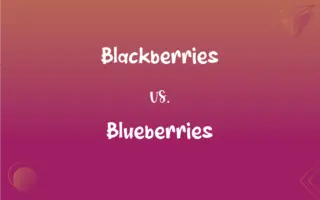Dextrose vs. Sucrose: What's the Difference?
By Janet White || Published on January 27, 2024
Dextrose is a simple sugar (glucose), a primary energy source, while sucrose is table sugar, composed of glucose and fructose, commonly used as a sweetener.

Key Differences
Dextrose, chemically identical to glucose, is a simple sugar that the body uses directly for energy. Sucrose, on the other hand, is a disaccharide composed of glucose and fructose and must be broken down into these components before the body can use it for energy. Both sugars are carbohydrates but differ in their chemical structures and how the body processes them.
In the food industry, dextrose is often used in baking and in processed foods as a sweetener. Sucrose, which is commonly known as table sugar, is widely used in a variety of culinary applications, from sweetening beverages to baking. Both dextrose and sucrose contribute to the taste and texture of foods, but their nutritional values and effects on blood sugar levels differ.
Dextrose is frequently used in medical settings, especially in intravenous solutions to provide quick energy to patients. Sucrose, due to its composition, is not typically used in medical treatments. Both sugars, however, play significant roles in food and health science, with distinct applications based on their properties.
The impact of dextrose and sucrose on blood sugar levels is different. Dextrose has a higher glycemic index, meaning it can raise blood sugar levels more quickly than sucrose. Sucrose, consisting of two sugar molecules, takes longer to break down, resulting in a more gradual increase in blood sugar levels. Both need to be consumed in moderation, especially by individuals with diabetes.
Dextrose is often used in sports nutrition, providing quick energy for athletes. Sucrose, being a common household sugar, is used more broadly in everyday cooking and baking. Despite their different uses, both dextrose and sucrose are important sources of energy in the diet.
ADVERTISEMENT
Comparison Chart
Chemical Composition
Simple sugar (glucose)
Disaccharide (glucose + fructose)
Usage in Food Industry
Baking, processed foods
Broad culinary use, table sugar
Medical Use
Intravenous energy solutions
Not typically used in medical treatments
Glycemic Index
Higher, quick blood sugar increase
Lower, gradual blood sugar increase
Role in Nutrition
Quick energy source
Common sweetener, energy source
ADVERTISEMENT
Dextrose and Sucrose Definitions
Dextrose
A simple sugar chemically identical to glucose.
Dextrose is often added to energy drinks for rapid energy boost.
Sucrose
A disaccharide composed of glucose and fructose.
Sucrose is the scientific name for table sugar.
Dextrose
Used as a sweetener in processed foods and baking.
Dextrose is used in this recipe to enhance the sweetness.
Sucrose
Breaks down into glucose and fructose in the body.
Sucrose is metabolized differently than simple sugars.
Dextrose
Commonly used in sports nutrition and energy products.
These energy bars contain dextrose for immediate fuel.
Sucrose
Has a lower glycemic index compared to dextrose.
Sucrose causes a more gradual increase in blood sugar levels.
Dextrose
Has a high glycemic index, affecting blood sugar levels quickly.
Dextrose is used by athletes for a quick energy spike.
Sucrose
Found naturally in fruits and vegetables.
Apples contain sucrose, which gives them a sweet flavor.
Dextrose
A primary energy source in intravenous solutions.
The patient was given a dextrose solution to raise her blood sugar levels.
Sucrose
Commonly used as a sweetener in a wide range of foods.
Sucrose is added to coffee to enhance its taste.
Dextrose
The dextrorotatory form of glucose, C6H12O6·H2O, the naturally occurring form of glucose found in all organisms. Also called dextroglucose.
Sucrose
A crystalline disaccharide of fructose and glucose, C12H22O11, extracted chiefly from sugarcane and sugar beets and commonly known as table sugar. Also called saccharose.
Dextrose
The naturally-occurring dextrorotatory form of glucose monosaccharide molecule.
Sucrose
(carbohydrate) A disaccharide with formula C12H22O11, consisting of two simple sugars, glucose and fructose; normal culinary sugar.
Dextrose
A sirupy, or white crystalline, variety of sugar, C6H12O6 (so called from turning the plane of polarization to the right), occurring in many ripe fruits, and also called glucose. Dextrose and levulose are obtained by the inversion of cane sugar or sucrose, and hence the mixture is called called invert sugar. Dextrose is chiefly obtained by the action of heat and acids on starch, and hence called also starch sugar. It is also formed from starchy food by the action of the amylolytic ferments of saliva and pancreatic juice.
Sucrose
A common variety of sugar found in the juices of many plants, as the sugar cane, sorghum, sugar maple, beet root, etc. It is extracted as a sweet, white crystalline substance which is valuable as a food product, and, being antiputrescent, is largely used in the preservation of fruit. Called also saccharose, cane sugar, etc. At one time the term was used by extension, for any one of the class of isomeric substances (as lactose, maltose, etc.) of which sucrose proper is the type; however this usage is now archaic.
Dextrose
An isomer of glucose that is found in honey and sweet fruits
Sucrose
A complex carbohydrate found in many plants and used as a sweetening agent
FAQs
How is dextrose used in foods?
It's used as a sweetener in baking and processed foods.
Is dextrose natural or synthetic?
Dextrose can be found naturally but is often produced commercially.
What is dextrose?
Dextrose is a simple sugar, chemically the same as glucose.
Where is sucrose found naturally?
Sucrose is found in fruits, vegetables, and sugar cane.
How is sucrose metabolized?
It's broken down into glucose and fructose in the body.
What is the primary use of sucrose?
It's widely used as a general-purpose sweetener.
Is sucrose better than dextrose for baking?
Sucrose is more commonly used for its flavor and properties.
Does sucrose have any health benefits?
It provides energy but should be consumed in moderation.
What is sucrose?
Sucrose is table sugar, a disaccharide made of glucose and fructose.
Can dextrose be used medically?
Yes, in IV solutions for quick energy and blood sugar regulation.
How does sucrose affect blood sugar?
It raises blood sugar levels more gradually than dextrose.
Is dextrose suitable for diabetics?
Caution is advised as it can quickly raise blood sugar levels.
How does the body process dextrose?
It's rapidly absorbed and used for energy.
What's the glycemic index of dextrose?
Dextrose has a high glycemic index.
Are dextrose and sucrose interchangeable in recipes?
Not always, as they have different sweetness levels and properties.
Are there any allergies associated with dextrose?
Allergies are rare, but sensitivities can occur.
Can dextrose help with athletic performance?
Yes, it can provide quick energy for athletes.
Is sucrose vegan?
Pure sucrose is vegan, but some sugar processing uses animal products.
Does dextrose contain fructose?
No, dextrose is purely glucose.
How does sucrose impact dental health?
Like all sugars, it can contribute to tooth decay.
About Author
Written by
Janet WhiteJanet White has been an esteemed writer and blogger for Difference Wiki. Holding a Master's degree in Science and Medical Journalism from the prestigious Boston University, she has consistently demonstrated her expertise and passion for her field. When she's not immersed in her work, Janet relishes her time exercising, delving into a good book, and cherishing moments with friends and family.







































































